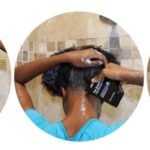
Have you ever wondered why African American hair tends to be prone to dryness? Many individuals with this hair texture often find themselves struggling to maintain moisture, leading to brittle and damaged hair. Understanding the reasons behind this dryness can help you implement effective strategies to keep your hair healthy and hydrated. In this article, we will explore the factors that contribute to the dryness of African American hair and provide tips to combat this common issue, so you can achieve luscious, moisturized locks.
Understanding Hair Structure
Definition of hair cuticle
The hair cuticle is the outermost layer of the hair shaft, consisting of overlapping layers of flat, scale-like cells. Its main function is to protect the inner layers of the hair from damage and moisture loss.
Role of hair cuticle in moisture retention
The hair cuticle plays a crucial role in determining the moisture content of the hair. When the cuticle is intact and lying flat, it locks in moisture and keeps the hair hydrated. However, if the cuticle is damaged or lifted, moisture easily escapes, leading to dryness and brittle hair.
Differences in the hair structure of African Americans compared to others
African American hair has a unique structure compared to other hair types. It is typically characterized by tightly coiled or kinky curls. The cuticle of African American hair is naturally more porous and tends to have more gaps and lifted scales. This makes it more susceptible to moisture loss and dryness compared to straighter hair types.
Contribution of Natural Hair Texture
Nature of tight curls in African American hair
The tight curls in African American hair create numerous bends and twists along the hair shaft. This structure makes it difficult for natural oils produced by the scalp to travel down the hair strands, resulting in a lack of natural lubrication and moisture distribution. As a result, African American hair tends to be drier by nature.
Role of hair texture in moisture retention or loss
The texture of African American hair, with its tight curls, presents challenges in retaining moisture. The tightly coiled pattern hinders the free movement of natural oils from the scalp to the hair ends. Additionally, the gaps in the cuticle make it easier for moisture to escape, leading to dryness. Proper hair care techniques and products tailored to the specific needs of African American hair can help address these moisture retention issues.
Effects of Health and Diet
Impact of overall health on hair condition
The overall health of an individual plays a significant role in the condition of their hair. Poor general health, including nutrient deficiencies or an unbalanced diet, can contribute to dryness and brittle hair. It is essential to maintain a healthy lifestyle, eat a balanced diet, and address any underlying health issues to promote optimal hair health.
Importance of hydration for hair health
Proper hydration is vital for maintaining hair health, including African American hair. Drinking an adequate amount of water throughout the day helps nourish the hair follicles and maintain the moisture balance in the scalp and hair strands. Hydrated hair is less prone to dryness and breakage.
Specific nutritional deficiencies contributing to dry hair
Certain nutritional deficiencies can directly contribute to dry hair. For instance, deficiencies in vitamins like biotin, vitamin D, and vitamin E can affect the hair’s ability to retain moisture and remain healthy. Iron deficiency can also lead to dry and brittle hair. A balanced diet rich in essential nutrients and proper supplementation, if necessary, can help combat these deficiencies and promote healthier hair.
Contribution of Weather and Environment
Impact of humidity on African American hair
Humidity can have a significant impact on African American hair. High levels of humidity in the air can cause the hair to absorb excess moisture, leading to frizz, swelling, and ultimately dryness. On the other hand, in low humidity environments, the hair is more susceptible to moisture loss, resulting in dry and brittle hair. Adjusting hair care routines and using protective styling techniques can help manage the effects of humidity on African American hair.
Effects of exposure to the sun
Excessive exposure to the sun can be detrimental to the health of African American hair. The sun’s ultraviolet (UV) rays can damage the hair cuticle, leading to dryness, breakage, and loss of color. It is essential to protect the hair from sun exposure by wearing hats or using hair products with UV filters. Additionally, regular deep conditioning treatments can help replenish moisture and repair sun-damaged hair.
Influence of cold and dry climates on hair dryness
Cold and dry climates can be particularly harsh on African American hair. The cold temperatures and low humidity levels can strip the hair of moisture, causing it to become dry and brittle. Protective styling, such as wearing satin-lined hats or scarves, and using moisturizing products specifically formulated for colder climates can help combat the drying effects of these environments.
Use of Styling Practices and Products
Impact of heat-based styling tools
Frequent use of heat-based styling tools, such as flat irons and curling irons, can significantly contribute to hair dryness. The high temperatures from these tools can damage the hair cuticle, causing moisture to escape and resulting in dry, brittle hair. Minimizing the use of heat styling tools and applying heat protectant products can help protect the hair from unnecessary damage and moisture loss.
Effects of chemical treatments on hair
Chemical treatments, such as relaxers, perms, and hair coloring, can strip the hair of its natural oils and disrupt the hair’s moisture balance. These treatments often involve the use of harsh chemicals that can damage the hair cuticle and lead to dryness and breakage. It is crucial to choose reputable, professional stylists for chemical treatments and follow up with deep conditioning treatments to restore moisture and maintain hair health.
Role of inadequate or excessive washing in hair dryness
Inadequate or excessive washing can contribute to hair dryness. Washing too frequently can strip away the natural oils that moisturize the hair, leading to dryness and increased porosity. On the other hand, not washing the hair regularly can result in product buildup and clogged hair follicles, hindering proper moisture absorption. Finding the right balance and using appropriate cleansing products for African American hair is essential for maintaining optimal moisture levels.
Potential Genetic Factors
Influence of genetic predispositions to dry hair
Genetics can play a role in predisposing individuals to dry hair. Some people naturally produce less sebum, the scalp’s natural oil, which can lead to dryness and a lack of moisture in the hair. Understanding and accepting one’s genetic predisposition can help shape appropriate hair care routines and product choices for better moisture retention.
Hereditary conditions contributing to hair dryness
Certain hereditary conditions can contribute to hair dryness. For example, conditions like eczema or psoriasis can affect the scalp’s ability to produce and retain moisture, leading to dry and itchy scalp, which can further impact the health of the hair. Consulting with a dermatologist or trichologist can help identify any underlying conditions and develop appropriate treatment plans to alleviate dryness.
Influence of Hair Care Routines
Importance of regular conditioning for African American hair
Regular conditioning is crucial for maintaining moisture in African American hair. Conditioners help to replenish moisture, smooth the cuticle, and improve the hair’s ability to retain hydration. Deep conditioning treatments, leave-in conditioners, and moisturizing hair masks can significantly benefit dry hair. Additionally, incorporating regular oil treatments or hot oil massages can help nourish and hydrate the scalp.
Use of inappropriate hair products
Using hair care products that are not specifically formulated for African American hair type can contribute to dryness. Some hair products contain ingredients that can strip away natural oils or build up on the hair, leading to dryness. It is important to choose products that are designed for the specific needs of African American hair, such as those labeled as moisturizing, hydrating, or created specifically for textured hair.
Role of Stress and Hormonal Changes
Impact of stress on hair health
Stress can have a significant impact on hair health, including dryness and hair loss. Elevated stress levels can disrupt the hair growth cycle, leading to hair thinning and increased shedding. Additionally, stress can affect sebum production, resulting in an imbalance that contributes to dryness. Managing stress through practices like meditation, exercise, and seeking support can help promote overall hair health.
Effects of hormonal changes or imbalances on hair condition
Hormonal changes or imbalances can influence the condition of the hair. Fluctuations in hormone levels, such as during pregnancy or menopause, can disrupt the hair’s moisture balance and lead to dryness. Conditions like polycystic ovary syndrome (PCOS) can also affect hormonal levels and contribute to hair dryness. Consulting with a healthcare professional or dermatologist can help identify any hormonal imbalances and develop appropriate treatment plans to address hair dryness.
Dealing with Hair Dryness
Importance of hydrating and moisturizing
Hydrating and moisturizing are essential steps in combating hair dryness. Regularly hydrating with water and applying moisturizing products can help replenish moisture and maintain the hair’s hydration levels. Deep conditioning treatments, leave-in conditioners, and hair oils can help improve moisture retention and restore softness and elasticity to dry hair.
Appropriate products for African American hair
Choosing the right products for African American hair is crucial for addressing dryness. Look for products that are specifically formulated for textured hair and labeled as moisturizing, hydrating, or nourishing. Avoid products that contain sulfates, alcohol, or harsh chemicals that can strip away moisture. Opt for natural ingredients like shea butter, coconut oil, and aloe vera, known for their moisturizing properties.
Importance of protecting hair from harsh environmental factors
Protecting the hair from harsh environmental factors is essential for preventing dryness. Wearing hats or scarves when exposed to the sun helps shield the hair from UV damage. Using a satin or silk pillowcase can reduce friction and moisture loss while sleeping. Minimizing exposure to extreme cold or dry climates by protective styling techniques can also help preserve moisture in the hair.
Preventing Hair Dryness
Appropriate hair care for African American hair type
To prevent hair dryness, it is important to follow a hair care routine tailored to the needs of African American hair. This includes regular conditioning, using moisturizing products, minimizing heat styling, and practicing protective styling techniques. Understanding the unique characteristics of African American hair and identifying the right products and techniques can help maintain optimal moisture levels and overall hair health.
Role of healthy lifestyle in maintaining hair health
Maintaining a healthy lifestyle is key to maintaining hair health. Eating a balanced diet, staying hydrated, exercising regularly, and managing stress levels all contribute to healthy hair. Nutrient-rich foods, such as fruits, vegetables, lean proteins, and whole grains, provide essential vitamins and minerals needed for healthy hair growth and moisture retention.
Regular professional care for hair
Regular professional care for African American hair is important for preventing dryness and maintaining overall hair health. Visiting a trusted stylist or salon that specializes in textured hair can help assess the hair’s condition, provide appropriate treatments, and offer personalized advice on caring for dry hair. Professional treatments, such as deep conditioning, protein treatments, and trims, can help restore moisture and address any damage.











